To welcome Shabbat I share this niggun by Yosef Guttman Levitt.
The wordless melody of the niggun can help us capture the mood, connection, and change that Kabbalat Shabbat ushers in.
Shabbat Shalom
To welcome Shabbat I share this niggun by Yosef Guttman Levitt.
The wordless melody of the niggun can help us capture the mood, connection, and change that Kabbalat Shabbat ushers in.
Shabbat Shalom
Wishing everyone a meaningful Pesach.
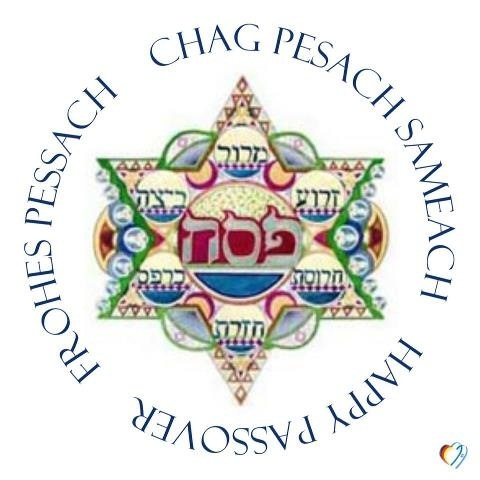
We have seen the enemy and he is us. So were the immortal words of the great American philosopher Pogo, the satirical cartoon creation of Walt Kelly. That droll quip speaks to a dark sinister reality about what is happening in the Jewish world, in direct contrast to the warning offered by Parshat Tzav.
God directs Moses to command the priests on what to do and how to do it as they fulfill their sacred responsibilities on behalf of the people Israel. It is clear that the sacred tasks require special ways of acting. There is too much at stake; for these are the priest making offerings to God on behalf of God’s people. The priest learn the strict code to which they must adhere. Deviating is not acceptable, and the consequences can be severe, as Nadav and Abihu will learn.
Later on, we learn that the nation itself is a nation of priests. That we as a nation are similarly charged with a series of behaviors that are required of us to fulfill our responsibilities. These laws are put forward in Torah and then developed by the rabbis and shared in the Oral Torah and the great works that expound upon these laws. Like our priestly class, the nation of Israel is bound to the laws of Torah on how to act in order to fulfil our sacred responsibilities of being a light to the nations.
That light has been dimming as a result of a move away from our role as faithful servants to something that embodies a hubris endangering and attacking our core values as a people. We have moved from the sacred work of Sanctifying God’s name to profaning God’s name, from Kiddush ha-Shem to Hillul ha-Shem.
At the most recent Rosh Chodesh at the Kotel we witnessed a brutal and tragic display of violence against the Women of the Wall. We do not agree on how we should engage in ritual. I respect other approaches to Judaism, even though I do not practice them. Likewise, there are many who would see my religious practice as unacceptable. However deep the disagreements may be, there is no justification for the violence perpetrated on the Women at the Kotel. I would argue that the shouting is an undermining of the special space that is the Kotel and place. But physical battery is blasphemy, plain and simple. It curses God’s name and everything that Judaism is supposed to represent. In the name of the sacred, everything sacred has been trashed, God’s great name was trampled in the mud. The violent encounter was in violation of all of Jewish Law and culture. This moment is a tipping point for us as a people. And this is not the only arena where our behavior needs to be critically examined. Tzav, commanded behaviors, require adherence to standards of decency and ethics. Are we acting as God has directed?
There is a rise in racism in Israel is an insidious cancer eating away at the very soul of the State. This racism dehumanizes the non-Jew, whether they be citizens of Israel or Palestinians of the West Bank and Gaza. The inability to see the other as one with fundament human and civil rights, entitled to dignity and respect, undermines the ideals of both the Jewish State and the Jewish religion.
The violent racist Kahanists, Otzmah Yehudit, have a new-found acceptance in Israeli politics. The inclusion of these group dedicated to an extreme racist view, enforced by thuggery, should be unthinkable, but instead of repudiating them and everything they stand for, they are legitimized and welcomed. There are appeals to the courts seeking redress, but ultimately the Israeli people must speak out unequivocally against this base and baseless hatred.
This issue also confronts American Jewry. As anti-Semitism is on the rise, American Jews must respond. The manner in which we move forward will determine if we are no better than those who hate us. Can we be strong and resolute without resorting to similar tactics as those whose ideas we find dangerous and contemptible? Can we find sufficient security in this extraordinary place and time in our history to battle anti-Semitism and not feel disenfranchised by those contemptible people on the margins of society who seek to do us harm?
The second temple was destroyed, our sages say, due to Sinat Chinam, the baseless internecine warfare that existed within the Jewish people. Instead of a tolerant society with many different interpretations of Judaism, the People of Israel became a fractious group of competing sects intent on imposing their particular view on everyone, ultimately sacrificing everything. Can we reclaim the ideals of Klal Yisrael, or is history repeating itself?
Our leaders from across the breadth of our tradition including Rabbi Nachman the Hasidic master, Rav Kook the founder of religious Zionism, and Rabbi Abraham Heschel an American Prophetic voice, to name only three, all warned against hatred against others, no matter how deeply offensive we might find certain practices. They encouraged us to embrace the best of our tradition so that we may bring forward our values in the world. Tzav as part of the book of Leviticus, as part of Torah, lays out the rules for how to act as a people in sacred service to God. These rules are based on core values that are central to every expression of Judaism, religious, ethnic, and cultural. When we violate the values that are at our core, we betray the sacred aspirations of our tradition. Tzav reminds us of our duties and sacred obligations and admonishes us not to stray. Tzav demands more of us, we need to take heed and act better.
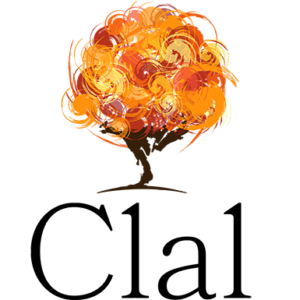
I am excited to share that I am co-leading a group of emerging Christian leaders on a trip to Israel as part of the Stand and See Fellowship. This unique initiative sponsored by CLAL brings seminarians to the Holy Land with a rabbi, a Christian scholar, and a local guide. Although our threesome might sound like the beginning of an amusing joke, this is a serious enterprise designed to connect these future faith leaders emotionally, spiritually and intellectually to Israel and promote a nuanced understanding of contemporary Palestinian life.
Learn more
Here is the press release from CLAL:
CLAL is excited, honored and proud to announce our Stand and See Fellowship trip being conducted with Minneapolis’ Luther Seminary. The trip will be co-lead by our colleague and RWB alum, Rabbi David Levin, and Luther Professor, Rev. Matt Skinner Ph.D. Both bring deep experience and intellectual depth to this work — Matt as a professor of New Testament Studies and David with years of congregational, communal and educational leadership — and each is a genuine thought partner whose contributions to Stand and See will be felt far beyond this particular journey.
Each year I hear the following:
~Put Christ back into Christmas
~Get materialism out of Christmas
~Don’t Mix Hanukkah and Christmas
Do this, don’t do that; lots of proscriptions and prescriptions. But maybe we might pause and appreciate it precisely as it is.
Christmas is more than the birthday of Jesus. Indeed, as we all know, it is not the day of his birth. That Christmas is more than the marking of Jesus’ birth is not new. The idea that we may universalize the message of the holiday has been at the heart of a Christian message, softly spreading of the values at its core. I have always been taken by the beauty of the idea expressed in John 3:16: “For God so loved the world that He gave His only begotten son…” It is a message of love and light and our world does not have enough of either. The message is enlightening and one I can deeply appreciate even if I do not embrace the theology.
To those who attend mass or use this as a moment of sacred holiness, I stand respectfully quiet. To those who decorate homes with all kinds of festive lights, I drive by like a tourist taking in the spectacle, even grading for taste, presentation, originality, and use of the secret ingredient (with deference to Iron Chef). For those who gather the family to share a meal and time together, I only wish we had more reasons to do that. For those who give gifts, no matter how big or small, I hope that each gift is an expression of love and caring for both the giver and the receiver, bringing both close together.
Christmas in America is beautiful, even those parts some of us just don’t get. But that is okay. So, to everyone, a very Merry Christmas (and a Happy New Year)!
With the marking of Sheloshim for the victims in Pittsburgh and the passage of time, an important question is now being raised, where do we go from here? Or more simply put, What Now?
In the aftermath of tragedy, it is important to rebuild and move forward. In response to a natural disaster, the need to rebuild is clear. Houses, infrastructure, all of the things physicallydamaged or destroyed need to be put back into place, often rebuilt from scratch. But with a disaster of this nature, the rebuilding is not so clearly defined. What is the enduring message we want our rebuilding to carry?
How do we honor the legacy of those taken from us, the outpouring of support from the greater community, the lastingJewish values that have kept our people and our tradition and will continue to do so? Other difficult but important questions to consider include these: Anti-violence training prompted someone to ask how can she run to safety, when saving herself means she leaves behind the more vulnerable? Another question, how do we practice hospitality and welcome people into our Jewish homes (synagogues), when the front door is locked or attended by an armed guard? How can we feel safe when anti-Semitic incidents are not only on the rise, but finding new levels of public acceptance?
There is an urge to rebuild the physical structures quickly, to return to normal and stand up to the hatred with defiance. But there was an important lesson learned from rebuilding lower Manhattan post 9/11. The deliberate but protracted process achieved amazing results. What was no longer is and recreating something from before does not acknowledge the event that has irrevocably changed us. The memorials honor the event and the human tragedy as well as the spirit of courage, hope and love. So too, the Shanksville memorial that I visited on my return from Pittsburgh is a moving and thoughtful tribute to the brave men and women on that fateful flight, United #93. It is prudent to resist the temptation to act too quickly, opting instead for aslower and deliberative process. The result will hopefully become an enduring symbol of strength, courage, hope and love, the best aspirations of our tradition.
The process of recovery will take time. It is a natural desire to try to shorten, if not deny, the grieving process. But our tradition clearly understands the importance of this special time. We grieve and then slowly begin the process of reintegrating ourselves into life with the experience and pain of loss a new part of us. Only then might we gain a new perspective. And from this perspective, we can create something honoring those we have lost and promoting our values for the sake of the generations to come.
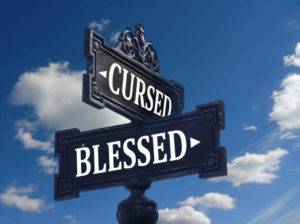 In the Torah, Moses sets out a choice for us this past week. Blessings and curses. It is a deceptively easy binary choice. Given good stuff or bad stuff as alternatives, it seems like a no-brainer. I opt for the good stuff!
In the Torah, Moses sets out a choice for us this past week. Blessings and curses. It is a deceptively easy binary choice. Given good stuff or bad stuff as alternatives, it seems like a no-brainer. I opt for the good stuff!
But it’s really not so simple. For what does that mean for us to choose the Blessings, especially to us in the modern world? That is the fundamental question to consider in the month of Elul, leading up to the Yamim Noraim, these special High Holidays. Perhaps we, like our ancestors, are metaphorically also on the verge of entering into our own Promised Land. It is more complicated than: Choose Blessings and you go in; Choose Curses and you stay out. Because it is about more than entering The Land; it is about living fully while there, possessing it and becoming one with it.
During Elul, as we prepare for Rosh Hashanah and Yom Kippur, we ponder the choices we make in our lives. As we reflect on the year past, we see successes and failures. And as we look ahead, we use this understanding to chart our course. Are we on the path we want to be on, the one we should be on, the one we need to be on? And presuming we have been blown off course by the winds and currents of life, how do we right our ship and get back on our path?
Elul is our time to consider these questions. Before we can ask for forgiveness we need to know where we went astray and maybe understand why. Before we can ask to be written in the book of life, we need to know what it means to choose a life of blessings so that this coming year brings us meaning and connection. Then we are able to approach the Divine to make things right and set a course forward for a year where we deliberately choose blessings, knowing what they are and how we might pursue them.
L’Shanah Tova!

Maerten van Heemskerck
“Nachamu, Nachamu Ami”- Take comfort, my people. So begins Isaiah 40, the readings we use for the Shabbat after Tisha B’Av.
Tisha B’Av is a day of deep sorrow, for so many of the catastrophes that have befallen the Jewish people are linked to this day. We fast and read the book of Lamentations recalling the destruction of the First Temple.
The prophet’s urging to take comfort seems more than for us to be consoled in our time of grief. It urges us to look beyond our grief. For we will rise up, continuing life continuing the ongoing work as partners in God’s creation in spite of, or perhaps because of the loss that we encounter. We will remember, but we are exhorted to move forward both as individuals and as a people. The world will go on and we must take our place to continue to build.
History has shown that out of the ashes, like a phoenix, we will rise up. Carrying our memories of what was lost, we will create new memories. As we commemorate the losses marked on Tisha B’Av, we also take tentative but deliberate steps forward out of our grief towards our tradition’s aspirations of a better world that we work to create and we find our comfort through this renewed purpose.
When we rise from Shiva, we are instructed to go outside and walk around the block. This is symbolic of our reentering the world. Changed because of our loss, but compelled to move forward honoring the memory of the loved one lost, or in this case, the loss befallen upon our people. The values we hold dear; caring for the widow and stranger, clothing the naked and feeding the hungry are the cornerstones for the ongoing work of Tikkun Olam and creation that is ever-present. We must also vote; for voting is our most precious special franchise granted to all who are blessed to live in the United States. We can leverage our work through elected representatives fighting for us to achieve our vision of a better world.
We rise not only with our voices but with our actions. For ours is to pray with our feet, as Rabbi Heschel once said. We can make our country and our world a better and more compassionate place through our actions. Nachamu, Nachamu Ami.
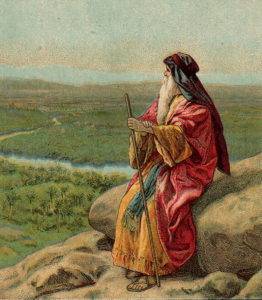 As we begin the last book of the Torah, Moses confronts this question in Parshat Devarim.
As we begin the last book of the Torah, Moses confronts this question in Parshat Devarim.
Even the title begs the question. Devarim, what are the words and things? What is the story we will tell to those we hope will carry it in their hearts after we are gone?
For most of us, this requires us to project forward in order to look back. But it cannot be make-believe; our legacy will be based on the life we live. The things we do will be the basis for the memories our loved ones will recall. How we touch their lives will define whether they can celebrate having had us in their lives. Our legacy will not have the great accomplishments of Moses, of course as our tradition tells us, there has never been another like Moses. Our legacy will be the impact and influence we have had on our loved ones. But will we be the best version of ourselves?
The story is told of Reb Zusya, the Chasidic Master, who struggled at the end of his life. He awoke panicked from a dream about the prospect of entering Heaven. His students tried to support their beloved teacher claiming he was indeed great like Moses and Abraham. Zusya replied that he knew that God would not compare him to Moses and Abraham but instead, God would ask why Zusya wasn’t more like Zusya?
If we do not live up to all that we can be, we do not realize our full potential. And importantly, we let ourselves and our loved ones down. Only we can write our story by living our lives as best and as fully as we can. Then we will truly leave a worthy inheritance, a life of merit and honor, of love and accomplishment that will touch the hearts of those we care about.
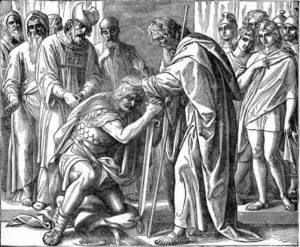 Your loved ones are your legacy. That is an important message I learned from last week’s Torah Portion Pinchas. We must consciously remember those closest to us, especially even when our work, our mission, or our very essence might have us focus on everyone else.
Your loved ones are your legacy. That is an important message I learned from last week’s Torah Portion Pinchas. We must consciously remember those closest to us, especially even when our work, our mission, or our very essence might have us focus on everyone else.
Pinchas’ legacy is established in the aftermath of his zealotry. The legacy of Zelophehad is also set; his daughters ensuring their father’s name is not lost and they can be rightful inheritors of his property. Moses passes the mantle of leadership to Joshua as part of his legacy. However, two people are glaringly missing: Gershom and Eliezer, the two children of Moses. What happened to them?
We can only imagine the ambivalence of these two sons watching their father in all his greatness. They see him lead with the most profound wisdom and love for both his people and God, yet he loses sight of his own children. It is a sad state of affairs for these two children to be ignored. The text screams out in its complete silence; for there is no mention of them at all. It is a modern-day message to all of us.
How often do we neglect our own? For many of us in the “caring” professions, the demanding hours prioritize others over family. For those of us in the clergy, the RKs (Rabbi’s Kids) often complain they are neglected because their parent is so busy actively involved in the lives of the congregants they serve. And those of us dedicated to building a career, we find long hours away from our children the price we pay for success.
For us to leave a truly worthy legacy, even the greatest among us need to make time for those closest to us. We all have shortcomings and with the benefit of hindsight, we all know where we could have done better. But more importantly, we need to know in our hearts that we do the very best we can and what we do is for the benefit of our family. For if we do that, then our children will know that they were loved. And that is the most beautiful blessing and legacy of all.